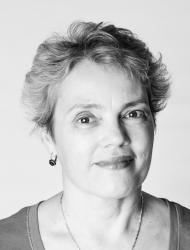Composer Leon Radojkovic on bringing movies to life
Leon Radojkovic never learnt music as a kid growing up in Auckland. In fact, he was in his teens when he picked up his first instrument: the guitar. Because of its rock-and-roll allure, of course.
But that instrument led him in directions not taken by the average member of a garage band.
Radojkovic is now a musician and composer, and has worked as musical director for New Zealand productions including Jesus Christ Superstar and Brel. He is also the creative force behind Live Live Cinema, an immersive theatre experience in which B-grade horror movies—“silenced” by removal of their soundtracks—are accompanied by lip-synching actors, a seven-piece band and a Foley artist.
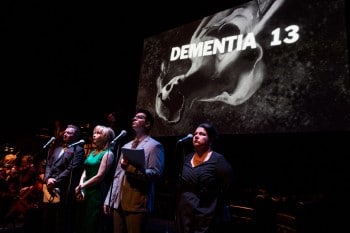
The result, promoted as “gripping, spine-tingling and humorous”, celebrates the magic of sound in cinema, as well as the power of story-telling.
“I just like watching films,” Radojkovic says. “I like the way that sound and images go together. I was always interested in doing something along those lines, but I wasn’t sure what.”
This interest in film music surfaced in a band called Dr Colossus: “We used to play a lot of bits and pieces from film scores, and we’d do shows that were exclusively music from films.”
Radojkovic found himself remembering silent movies he had seen with live accompaniment—in one case an orchestra, in another electronic music.
“I was thinking whether that basic idea could be extended a little bit,” he says. “The obvious answer seemed to be to use a sound film, because that introduces a lot more elements and complexities. It also offers more opportunities to influence the way the audience experiences the film. There’s not just music, there’s also the actors and the way they chose to build the characterisations and how they deliver their lines. There’s also the sound effects.”
“You can really shape and change the film’s images,” says Radojkovic. “You can change the meaning.”
He’s right, according to recent academic work on film soundtracks. Although the bulk of cinema analysis focuses on film’s visual elements, a substantial number of theorists now pay serious attention to film sound. They point out that films are made up of many fragments, and that music acts as a sort of glue, bonding individual shots into a cohesive story. Even though we hear it subliminally, movie music guides our emotional responses, builds mood and defines characters. And among the many contributions made by sound effects is the creation of three-dimensional space that gives authenticity to the flickering one-dimensional image on the screen.
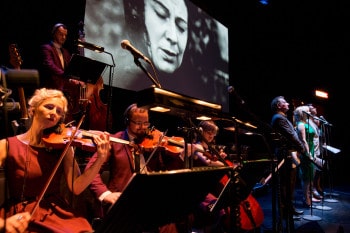
The two films reworked by Live Live Cinema—Francis Ford Coppola’s 1963 Dementia 13 and Carnival of Souls (Herk Harvey, 1962)—are both full of strange situations and bizarre characters. The original versions invited audiences to experience disorientation, shock, fear—an emotional roller-coaster involving some of our most primal reactions.
These reactions are carefully preserved—and even heightened—in the versions presented by Live Live Theatre. The “silenced” film is projected onto a screen while the band plays Radojkovic’s new score (he plays keyboards). Additional instruments include “a classic rock-band set up”—bass (Jonathon Burgess), drums (Tom Broome) and guitar (Abe Kunin)—as well as strings for those typically cinematic emotional cues: violin (Alex Taylor), viola (Alex MacDonald), cello (Claire Cowan).
Meanwhile, Foley artist Gareth Van Niekerk creates sound effects—doors slamming, footsteps, as well as spooky and scary noises—in full view of the audience.
“That is part of the charm for these shows,” says Radojkovic. “The audience actually see exposed some of what goes on behind the scenes. You’re able to actually watch someone create all these sound effects in front of you.”
Foley work often involves long hours sequestered in a studio. However, because Van Niekerk is also a musician, he is comfortable performing on-stage. “He’s one in a million,” says Radojkovic. “It’s really quite fortuitous that I happened to have some of the right kind of people around me when I was thinking about this.”
Four actors voice all roles in the films: Fern Sutherland, Cameron Rhodes, Dan Musgrove and Micheala Rooney. All well-seasoned New Zealand stage and screen performers, they bring exceptionally versatile vocal skills to their multiple roles. “We’re lucky enough to have found people who have had a lot of experience,” Radojkovic says. One cast member, Cameron Rhodes, “actually works training other actors on how to use their voice correctly and things like that.”
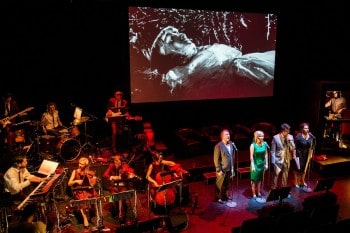
The on-stage work is demanding. “There’s really no leeway with it,” says Radojkovic. “If you’re on-stage in a conventional play and you miss a line or your timing’s slightly different, it’s really no big deal. You can recover. But with these shows, there’s no room for error at all. Once the film starts, you need to be bang-on, every single time, for the entire show. It’s really tough going. They spend hours rehearsing the timing, even before they start to worry about the actual quality of their performances.”
He suspects that the demands of the lip-synching makes this “an unusual kind of gig for a lot of actors because the focus is not solely on them.” In fact, one former performer, Chelsie Preston Crayford, summed it up: “We’re just here to serve the movie.”
Radojkovic praises all actors who have been involved since the production began. “Everyone who’s been involved, all of the actors, they’ve just loved the idea of it. They’re all people who, when they came in to audition, were extremely enthusiastic about it. And that was part of the winnowing process, I guess—finding people with that kind of attitude.”
In choosing the movies, Radojkovic describes looking for productions “that we like and have really great aspects to them, but are not great pieces of film. These are films that are made on a budget, with very short shooting schedules, under terrible conditions, with amateur actors. But they manage to achieve something quite remarkable even if they fall short in some ways.”
Radojkovic’s affection radiates when he describes how he came to pick Carnival of Souls. “I had watched it years ago,” he says. “It just sort of stuck in my head because it’s really beautiful in terms of cinematography. It’s got that great high-contrast black-and-white impressionistic atmosphere. It’s also got these amazing locations.
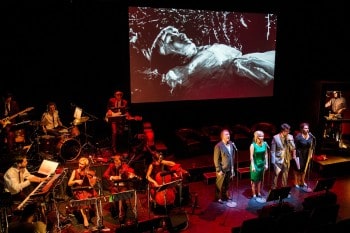
“The main one is this abandoned pavilion, which was a Mormon holiday resort on the edge of the Great Salt Lake in Utah. It was meant to be somewhere that Mormon families could go for wholesome family holidays. It had the largest ballroom in the world at the time. It was incredibly opulent. But then, the lake receded and people stopped going. It’s got this dilapidated, slightly threatening majesty about it. So that’s why I remembered that film.”
He points out that anyone could watch either Carnival of Souls or Dementia 13 at home. But, he says, “if you watch them on your television, it certainly wouldn’t be gripping, it wouldn’t be scary.”
The presentation of the films—with live music, sound effects and performances—means “we can really work to stay true to them but also try to revamp them for modern sensibilities. I think the fact that we do have, every show, people screaming or spilling their popcorn or throwing their drink, things like that, it does show how effective the presentation is. It really just demonstrates how powerful the soundtrack is, in terms of how you experience a bunch of images.”
Radojkovic adds: “There’s a lot of great work that goes on behind the scenes in movies, and a lot of hard work by a lot of people. I don’t know that they necessarily get the credit, nor the remuneration, that they’re due.”
“After doing the shows, I definitely have a different perspective on film after delving into the sound side in more detail,” says this creator/composer. “I can’t say for sure, but I would hope that our audiences also experience movies differently after seeing these shows.”
Changing how people hear movies: now that’s something that young Leon Radojkovic, guitar novice, never imagined doing.
Live, Live Cinema is at Riverside Theatres on 12 and 13 March 2015. For tickets and more information: www.riversideparramatta.com or 02 8839 3399.

